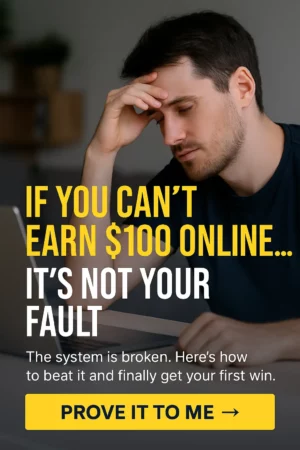You’ve heard the term tossed around in job boards, social media, and casual conversations—but what does it really mean to freelance? In a world where remote work, side hustles, and digital independence are becoming the new norm, freelancing has taken center stage as a flexible and empowering way to earn income on your own terms.
Whether you’re looking to escape the 9-to-5 grind, make extra money from home, or turn a skill into a full-time business, freelancing offers endless possibilities—but it’s often misunderstood.
In this guide, we’ll break down exactly what it means to freelance, how freelancing works in 2025, and the powerful truths every beginner should know before jumping in. If you’re curious about starting a freelance career or just want to understand what all the buzz is about, you’re in the right place.
What Does It Mean to Freelance?
At its core, freelancing means working for yourself rather than being employed by a single company. As a freelancer, you offer your skills or services to multiple clients—often on a project-by-project basis—without committing to long-term employment. You’re essentially your own boss, choosing when, where, and how you work.
Unlike traditional jobs that come with set hours and a fixed salary, freelancing offers flexibility and independence, which is why it’s become increasingly popular across industries like writing, design, tech, marketing, and virtual assistance.
The term “freelance” itself dates back centuries, originally describing a mercenary knight whose “lance” was free to fight for different lords. Today, it’s taken on a more digital twist: a freelancer is someone who monetizes their skills without being tied to a single employer.
So whether you’re writing blog content for businesses, designing logos for startups, or managing social media accounts, if you’re doing it independently and getting paid per task or contract—you’re freelancing.
Looking to turn your writing skills into a thriving business? Don’t miss our guide: 7 Proven Strategies to Become a Successful Freelance Writer
How Freelancing Works in 2025
Freelancing in 2025 is more accessible—and more competitive—than ever before. Thanks to remote work trends, digital platforms, and AI-powered tools, anyone with a marketable skill can start offering their services from anywhere in the world.
Here’s how the freelance process typically works:
You choose a skill or service to offer — writing, graphic design, web development, marketing, virtual assistance, etc.
Clients hire you on a per-project, per-hour, or retainer basis.
You deliver the work independently, on your own schedule, using your own tools and systems.
You get paid—usually through digital platforms like PayPal, Wise, or direct bank transfer.
Many freelancers use platforms like Upwork, Fiverr, and Freelancer.com to find work and build credibility. Others prefer to land clients directly through cold outreach, social media, or their personal website.
Modern freelancers often manage multiple clients at once, track their own income, pay self-employment taxes, and wear many hats—from marketing and sales to project delivery and client communication.
Want to learn how to market yourself as a writer? Read: 5 Powerful Marketing Strategies for Freelance Writers
Popular Types of Freelance Jobs
One of the best parts about freelancing is the variety of work available. Whether you’re a creative, a tech expert, or someone with strong organizational skills, there’s likely a freelance opportunity that matches your strengths.
Here are some of the most popular and in-demand freelance jobs in 2025:
Freelance Writing
From blog articles and website copy to email newsletters and product descriptions, freelance writing continues to be a top choice. Companies need skilled writers to create compelling content that drives traffic and conversions.
Ready to get serious about freelance writing? Don’t miss:
7 Proven Strategies to Become a Successful Freelance Writer
Graphic Design
Freelance designers create everything from logos and social media graphics to full brand identities. Tools like Canva, Adobe Illustrator, and Figma are essential in this space.
Web Development & Design
Freelancers in this niche build websites, landing pages, eCommerce stores, and web apps. Many specialize in platforms like WordPress, Shopify, or Webflow.
Social Media Management
Businesses hire freelance social media managers to handle content scheduling, community engagement, and growth strategies across platforms like Instagram, LinkedIn, and TikTok.
Virtual Assistance
Freelance virtual assistants help with administrative tasks such as email management, scheduling, data entry, and customer support—often acting as a business owner’s right hand.
Want to break into this field? Explore our guide:
How to Become a Virtual Assistant in 2025
Digital Marketing & SEO
Freelancers in this niche help businesses grow their online visibility through SEO strategies, paid ads, funnel building, and content marketing.
As the gig economy grows, new niches continue to emerge—from podcast editing and online course consulting to AI prompt writing and data labeling.
Benefits of Freelancing
Freelancing isn’t just a way to earn money—it’s a lifestyle shift that offers freedom, flexibility, and control over your career. That’s why millions of people are choosing to freelance full-time or as a side hustle.
Here are some of the biggest benefits of freelancing in 2025:
Flexible Schedule
You decide when to work. Whether you’re a night owl, a parent juggling school runs, or someone who thrives in bursts of productivity—you set your own hours.
Location Independence
Work from home, a coffee shop, or halfway around the world. As long as you have a laptop and internet connection, freelancing lets you work from virtually anywhere.
Unlimited Income Potential
Unlike traditional jobs with fixed salaries, freelancers can raise their rates, take on more clients, or offer premium services to boost earnings.
Creative and Professional Freedom
Choose the clients and projects that align with your interests. You’re not stuck doing tasks you hate—you can shape your freelance business around your passions.
Opportunity to Build a Personal Brand
Freelancers can create their own websites, grow an audience on social media, and position themselves as experts in their niche—something that’s nearly impossible in a 9-to-5.
Scalable Career Growth
Many freelancers eventually evolve into agency owners, consultants, or course creators. Freelancing can be the first step toward building a business of your own.
Challenges of Freelancing
While freelancing offers many rewards, it’s not without its hurdles. Building a successful freelance career takes more than talent—it requires discipline, strategy, and persistence.
Here are some of the most common challenges freelancers face:
Inconsistent Income
One of the biggest downsides is the lack of a steady paycheck. Some months may be booming, while others are quiet. Learning how to manage cash flow, build savings, and diversify income streams is essential.
No Traditional Benefits
As a freelancer, you won’t receive employer-provided health insurance, paid vacations, or retirement contributions. You’ll need to handle those responsibilities yourself, which can feel overwhelming at first.
Client Dependence
Relying too heavily on one or two clients puts your income at risk. If a client stops sending work or ends the contract, it can leave a sudden gap in earnings.
Constant Client Hunting
Especially in the beginning, you’ll spend a lot of time pitching, networking, and applying for gigs. Even established freelancers often need to market themselves regularly to maintain a steady flow of work.
Self-Motivation and Time Management
Without a boss looking over your shoulder, it’s easy to procrastinate or overwork. Staying focused, setting boundaries, and creating a sustainable routine are key to long-term success.
Admin Overload
Invoicing, contracts, bookkeeping, and taxes fall on you. It’s not just about doing the work—you’re also running a solo business behind the scenes.
Pro Tip: Use free tools like Wave for invoicing and Toggl for time tracking to streamline your workflow and stay organized.
Is Freelancing Right for You?
Not sure if freelancing is the right path? Take this quick self-check to find out:
🔹 Are you self-motivated?
As a freelancer, no one’s going to check in on you or remind you to work. If you can stay focused, meet deadlines, and manage your own time, you’re off to a strong start.
🔹 Are you okay with unpredictable income?
Freelancing comes with highs and lows. If you’re comfortable budgeting, saving, or diversifying your income streams, the freedom may outweigh the financial fluctuations.
🔹 Can you confidently promote yourself?
Clients don’t appear out of nowhere. Pitching, networking, and building a personal brand are part of the freelance hustle. If you’re open to learning how to market yourself, you’re on the right track.
🔹 Do you have a skill that others will pay for?
You don’t need to be a world-class expert. You just need one valuable skill—writing, design, admin support, tech, or anything in between—to get started.
Not sure where to focus? Check out 7 Proven Strategies to Become a Successful Freelance Writer to find your niche and grow from there.
🔹 Are you willing to learn and adapt?
The freelance world evolves fast. Clients’ needs change. Platforms shift. Tech improves. The most successful freelancers are lifelong learners who embrace change.
If you found yourself saying “yes” to most of these, freelancing could be a perfect match for your lifestyle and goals.
How to Start Freelancing in 5 Steps
So you’re feeling the pull toward freelancing—now what? The good news is, you don’t need a degree, fancy setup, or tons of experience to get started. What you do need is a clear, simple plan.
Here are five essential steps to launch your freelance journey:
1. Choose a Skill to Offer
Start with what you already know. Are you a strong writer? Great with graphic design? Love organizing and handling details? Pick a skill that solves a problem—and that people are actively paying for.
Tip: If you’re unsure where to begin, check out the services being offered on platforms like Upwork or Fiverr to see what’s in demand.
2. Set Up a Simple Portfolio
You don’t need a full-blown website to start. A single page or PDF with a short bio, your services, and a few samples is enough to show potential clients what you can do. You can even use Google Docs or Canva to create a clean, professional presentation.
Ready to stand out? Don’t miss this internal guide: 5 Powerful Marketing Strategies for Freelance Writers
3. Find Your First Client
Start with your network. Tell friends, family, or coworkers that you’re offering freelance services. Join Facebook groups, freelance job boards, or post on LinkedIn. You can also apply to gigs on sites like Freelancer or PeoplePerHour.
Start small—your first client is just the beginning.
4. Set Your Rates
Don’t undervalue yourself. Research what others are charging in your niche. Decide if you want to charge hourly, per project, or via monthly retainer. You can always raise your rates as you gain experience and confidence.
Pro Tip: Use a tool like Glassdoor or PayScale to get a rough idea of market rates.
5. Keep Learning and Improving
Each project is a stepping stone. Ask for feedback, improve your systems, and update your portfolio regularly. The freelancers who succeed long-term are those who treat it like a business—not just a side hustle.

Final Thoughts: Freelancing Is the Future of Work
Freelancing isn’t just a trend—it’s a movement. More people than ever are stepping away from traditional jobs to build careers on their own terms. Whether you’re looking for more freedom, a way to earn extra income, or the chance to turn your passion into profit, freelancing offers a flexible path forward.
But success doesn’t happen overnight. It takes persistence, self-discipline, and a willingness to grow. The good news? You don’t have to figure it all out alone.
Use this guide as your launchpad. Revisit the self-check, explore your strengths, and take that first step—even if it’s small.
Want to know more about building your freelance writing career? Start here:
7 Proven Strategies to Become a Successful Freelance Writer
And when you’re ready to stand out in a competitive market, check out:
5 Powerful Marketing Strategies for Freelance Writers
The world of freelancing is wide open. If you’ve been wondering what does it mean to freelance, now you know—and your journey can begin today.










